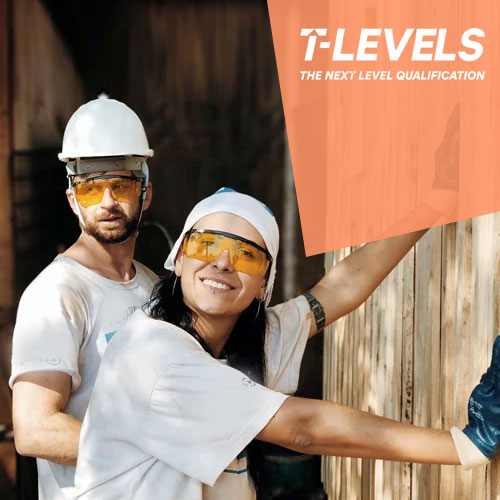These 6 questions always come up in construction interviews for any build-related job. Prepare in advance for a great interview…
If you’ve got an interview with a construction employer coming up, congratulations for making it this far! One of the best ways to prepare is to think about questions you might be asked, and have an idea how you’d answer them before you walk in the door.
You can expect the interviewer to ask you about:
- Your skills
- Your strengths (and maybe even your weaknesses)
- Why you want this particular job
- Your understanding of the construction industry and the job at hand
- Your future goals
Think of an interview as a polite conversation, not an interrogation. You’re allowed to ask questions, and ask the interviewer’s opinions about the job or the industry. This interview is a chance for you to see if you’d like the job, as well as a chance for the employer to see that you’re a good fit for the role.
You can practice replying to these example construction interview questions in front of a mirror, or with a helpful friend, before you head into the interview. This will make you sound natural. It will also help you to remember key points.
Interview question 1 – “Tell us about yourself”
It’s an open-ended question, with so many ways to reply. That can make you feel a bit nervous and you might want to tell them about your great love of cars or cats, but prepare some things in advance you can say about your education and work background.
You can talk about relevant work experience, useful skills you picked up on the way, and any work-related achievements you’re proud of.
You can also say a bit about what drew you to construction, and why you want to work for that employer.
Interview question 2: “Can you describe a time when you…?”
A COMPETENCY-BASED QUESTION – shows the interviewer if you have the skills, qualities and behaviour they are looking for in the right person for the job.
Example skills include teamwork, communication, problem solving, self-belief and self-management. They could include things like leadership, or using your initiative, or how you picked yourself up after a setback to overcome that challenge. These are all Young Professional skills and you can get free training in them right here at Youth Employment UK.
Before the interview, list out all the Young Professional skills. For each skill, think about a time when you demonstrated that skill in the workplace. The workplace could mean an internship, part-time job, weekend work, an apprenticeship or a full-time job, for example. If you’re just starting out and don’t have any work experience, you could think of an example when you used that skill in general/academic life.
Then you’ll be prepared for any skill the employer asks you about. Maybe you demonstrated teamwork by covering a shift when a team member couldn’t make it. Perhaps you demonstrated leadership by being asked to supervise a task on a construction site. Or perhaps you demonstrated self-management but getting on with your work unsupervised and being praised by your foreman or line-manager for the good work you did.
When you give an example of how you demonstrated a particular skill in the workplace, explain the situation briefly then say what actions you took and what the positive results were.
Interview question 3: ‘What would you do if…?’
A SITUATION-BASED QUESTION – shows the interview your approach to overcoming typical challenges in the job.
You can’t prepare for every situation in the world. Before you go into the interview, just think about your construction activity to date. What kind of problems and challenges came up? How did you deal with them? If it wasn’t your responsibility, how would you deal with them? Some typical challenges might be getting negative feedback from a manager, foreman or client. Or perhaps there was arguing in the team about the best way to do something that had to be resolved. You might be asked what to do if there was a health and safety hazard on the site, or if work was delayed by a scenario like a leak or an on-site injury.
Some pointers on answering:
However you answer, it’s fine to take a moment to think about the question and make sure you understand the scenario.
- It’s fine to ask for more information about the scenario if that will help you decide how to answer.
- You can think about relevant knowledge you’ve picked up on the way, or of similar situations you’ve experienced.
- Whatever your answer is, explain your reasoning. That’s what the employer wants to see – not just your solution to problems, but how you go about thinking things through.
- Think about what the job you’re applying for involves, and what the company might want to hear in your answer. Are they looking for someone who follows instructions? Someone who works well as a team? A high awareness of health and safety?
There is often more than one way to answer a question. When it’s a construction-related “what if” interview question, ensure your answer shows you are careful and know your way around a construction project with both technical skills and an awareness of health and safety.
Interview question 4: ‘What do you know about the company?’
Whether you’re a construction operative or a surveying graduate, you are bound to be asked this question – so be sure to do your reserach before the interview. Check the company’s ‘About Us’ website page to see what its values and goals are. The things a company shares on social media like Twitter and Facebook about can give a real insight into its business interests too!
With your research you should walk into the interview room with a clear picture of what your potential employer does. You’ll know if the company is a contractor or consultancy firm. You’ll have some idea of how big it is, and what its core values are. If you’re applying for an apprenticeship or graduate position, be sure to check these section on their website to get a feel for what they will offer you and what they want to see in you.
Be polite and positive in your answer. If you’ve heard they’re in dire financial trouble you won’t win any cookies by bringing it up in the interview.
After you’ve shared your thoughts you could follow up by asking your interviewer a relevant question to find out more about the company’s process and direction.
Interview question 5: “What do you know about this job?”
The employer wants to see if you you’ve got a fair idea of what the job you’ve applied for actually is. You should be able to answer this question based on the initial job description, and you may be able to relate to it through similar jobs you’ve done in the past.
You can answer this question in a way that shows you have realistic expectations of the role and what it could lead to. Your answer might include an understanding of your career path, so your goals for the future might include working towards a professional qualification, and considering the training and development on offer in the company.
Interview question 6: “Why should we hire you?”
This question can really make you feel you’re being put on the spot! Remember it’s a polite chat, not an interrogation. This is usually one of the final questions in a construction interview, so it’s your chance to leave the interviewer with a really good impression of you. When you answer the question, you may want to express your enthusiasm for the work involved and also for the company you’ve applied to. Relate your existing skills, knowledge and experience to the job description to show you’d be a perfect fit and would add value to the company.
It’s absolutely fine to talk about your skills, qualities and achievements. You can do so in a way that is polite and enthusiastic rather than arrogant to get your point across in a friendly way.
Construction interview questions to ask the employer
At some point, you’ll be asked if you have any questions. Always have a question ready! You don’t need a million of them, but a question shows you’re actively seeking employment with this particular employer, so it shows your commitment and enthusiasm. It also shows you can think things through, and might add value to the company by displaying initiative later down the line.
DON’T:
- Ask about salary, holidays and early promotion
- Ask about anything you’ve already covered in detail
DO:
- Ask about the company’s key projects, achievements, and things they’re proud of as a whole
- What kinds of challenges and opportunities the UK construction industry is currently facing
- The company’s approach to teamwork, training and development
Whether you’re going for a surveying job, a graduate position or a scaffolding role, it’s important to show you understand your future role, care about working with this company, and want to know more about what you can give them, not just what they can give you.
Have past examples of construction-related skills and achievements ready to talk about. You can talk about technical skills, projects you’ve worked on, and any academic or vocational qualifications which make you a fantastic fit for the job. For some construction roles you may be offered a technicial interview or tests to show your technical knowledge is up to par. It really depends on the construction job you’re going for, but with pre-prepared answers to the questions above you can’t go wrong.
Construction Career FAQs & Insights
What would you like to know about construction careers? Maybe we can help!
- DID YOU KNOW? You can get into construction careers with T Levels!
- What types of construction apprenticeship are there?
- Construction apprenticeships – the basics
- 3 ways into a construction career
- Top skills you need for construction careers
- What can you do with a degree in construction?
- What are the best-paid construction jobs in the UK?
- Construction interview questions – how to prepare














